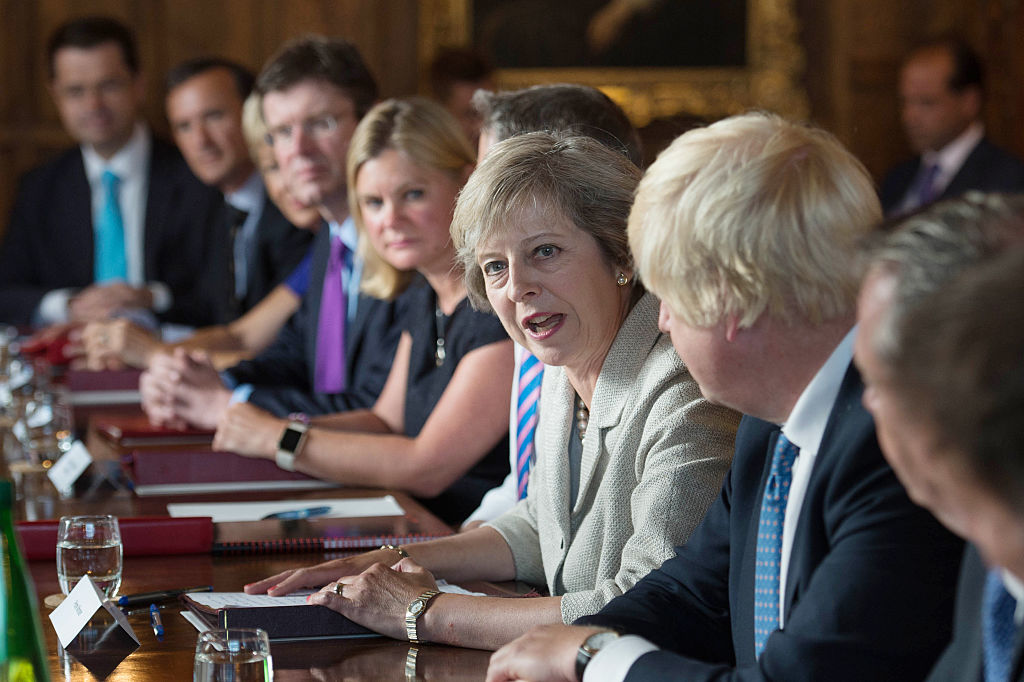‘It’s not just backbench Conservative MPs who expect ministers to pull together behind May: the great swathe of the electorate which either voted Leave, or voted Remain but recognises that a united team will achieve a better trading relationship for the future than a divided one, expects it too.’
This is the warning Graham Brady issued to badly behaved Tory ministers over the weekend. Writing in the Guardian, the chair of the all-powerful 1922 committee of backbench Tory MPs, presented the feuding Cabinet with a choice: get behind May or prepare for a Corbyn victory at the next election similar to 1997. This isn’t the first time Brady has had to speak out in a bid to get his party to take a minute to breathe before going into self-destruct mode. But it’s safe to say things are particularly fraught in the Conservative party at present.
The Sunday Times reports that 20 Tory MPs are preparing leadership bids should May fall, though one minister tells me that figure isn’t quite right – it’s more like 40. Meanwhile, May’s Cabinet are showing no signs of putting their differences aside anytime soon. As James revealed in the Sun, Michael Gove has been left so frustrated by No 10’s favoured post-Brexit customs plan that he literally ripped it up. That hasn’t stopped Greg Clark telling Sophy Ridge on Sky that the proposal is still on the table – and that the transition period could be extended.
There is hope, however, that this time next week there will be some much-needed clarity on the government’s plans. Although everyone in Westminster has got into the habit of calling meetings and events ‘crunch’ only for them to pass with little drama, this week looks to really be pivotal for both May’s premiership and the government’s Brexit strategy. On Friday, the Cabinet will head to Chequers for an away day to finally thrash out the government’s negotiating strategy for the Brexit trade talks. The conclusion of the meeting ought to be what decides the final wording – and tone – of May’s much-delayed Brexit white paper.
The main topic up for discussion when ministers meet at the Prime Minister’s grace-and-favour home is not whether all the egos can fit under one roof but what type of customs system the government should push for. The choices on the table are the customs partnership – the No 10 preferred option which would see the UK collect tariffs on behalf of the EU on goods entering the country – and Max Fac – the Brexiteers’ preferred option which would use technology (currently non-existent) to minimise the need for customs checks. There are concerns that the customs partnership would mean no trade deals with non-EU countries.
Which ever system they decide on has potential consequences for the type of immigration system and so forth. Neither solution is without problems. After the last bout of Cabinet deadlock on the issue, May created two mini working groups to improve the offers – Michael Gove, Liam Fox and David Lidington were tasked to improve the ‘customs partnership’. Meanwhile Greg Clark, David Davis and Karen Bradley were asked to improve the ‘maximum facilitation’ option. No-one in government is particularly optimistic about their efforts here.
At the moment, the Cabinet remains split between the two. And in recent weeks, it seems as though ministers have become more set in their beliefs than open to the others’ way of thinking. Philip Hammond and Greg Clark have been accused of encouraging business to speak out over Brexit concerns. Meanwhile, the Foreign Secretary’s alleged ‘f— business’ comment hardly helped win round supporters to Max Fac.
It follows that it’s hard to see how everyone can leave Chequers happy. If May does opt for a softer Brexit plan along the lines of the Norway model, it could push leading Brexiteer ministers to walk. Given that this is Theresa May, there’s a chance that she’ll find a little bit of road to kick the can down further. The problem is that with just ‘six weeks left’ of negotiating time with Brussels left before the October summit at which the outline of the final Brexit deal is supposed to be agreed, indecision could prove more dangerous than just picking a side.







Comments